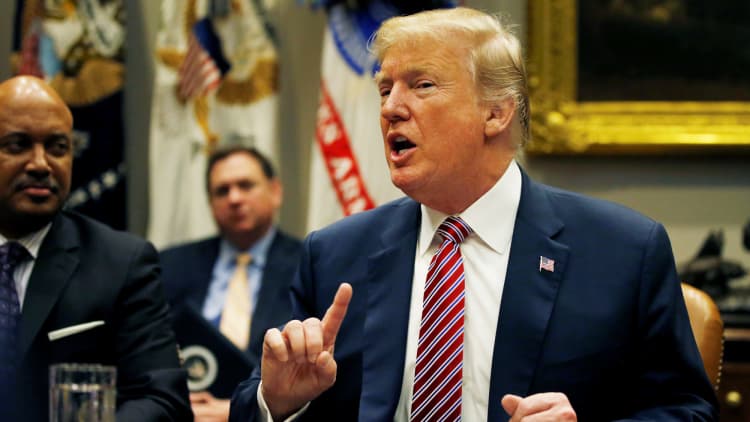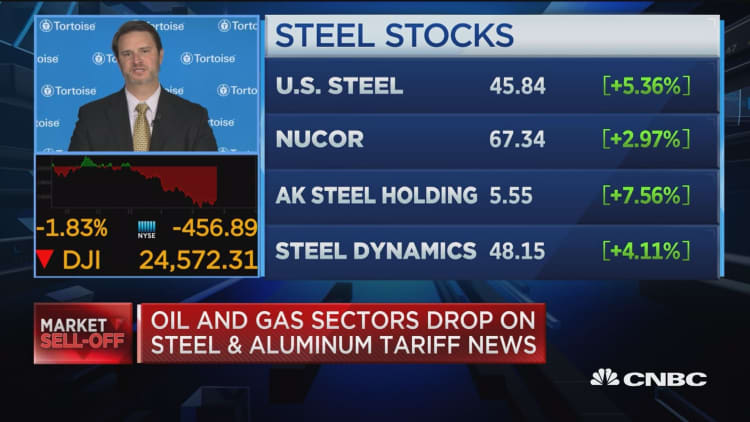
Unleashing U.S. energy production is a pillar of President Donald Trump's agenda, but industry groups are warning that his plan to slap tariffs on steel imports will sabotage his quest for "American energy dominance."
Trump said Thursday he will soon announce tariffs on steel and aluminum imports, telling reporters his administration plans to put a 25 percent fee on overseas steel. The news sent stock markets reeling and sparked fears of a trade war.
The tariffs could a have a big impact on the booming U.S. oil and gas industry and would be a double whammy for the growing solar power industry, which lost a battle to prevent Trump from imposing tariffs on some solar products earlier this year.
The actions ... are inconsistent with the Administration's goal of continuing the energy renaissance and building world class infrastructure.Jack GerardAmerican Petroleum Institute
U.S. oil and natural gas production has surged to all-time highs, driven by advanced technology that allows drillers to free hydrocarbons from shale rock formations. As output booms, the industry is developing new pipelines to bring oil and gas to market, export terminals to ship liquefied natural gas overseas and petrochemical plants to take advantage of cheap petroleum byproducts.
The oil and gas industry relies on foreign steel to build projects across many of these sectors, according to the American Petroleum Institute.
"The actions taken today are inconsistent with the Administration's goal of continuing the energy renaissance and building world class infrastructure," API CEO and President Jack Gerard said in a statement Thursday. "The U.S. oil and natural gas industry, in particular, relies on specialty steel for many of its projects that most U.S. steelmakers don't supply."

The pipeline sector illustrates that reliance. Only about half of the roughly four dozen mills that make line pipe for U.S. projects around the world are located in the United States, industry groups told the Commerce Department last year. At the time, the agency was preparing a plan to require pipeline makers to use only American-made steel and pipes in U.S. projects — a campaign the administration may have dropped.
When it comes to making pipes of increasing size and more stringent specifications, the number of American providers shrinks quickly. Only eight factories make pipes 30 inches in diameter or larger, and just three churn out pipes that meet certain thickness standards. No American companies make pipes of the highest grade, size and thickness.
Raising line pipe costs by 25 percent would add $76 million to the typical pipeline project, the Association of Oil Pipe Lines said in a report last year. It would tack on about $300 million for bigger projects like the Keystone XL, the mega-pipeline that Trump approved shortly after taking office after years of delay by the Obama administration.
"We are urging the administration to avoid killing U.S. jobs through a steel tariff that impacts pipelines," association President and CEO Andy Black said in a statement.
At least some analysts believe those warnings are overblown. While tariffs will indeed affect the final cost of projects, pipeline builders have ways of absorbing costs, according to Matt Sallee, an energy portfolio manager at investment firm Tortoise.

"I don't see a huge negative impact to the cost of building a pipeline," he told CNBC's "Power Lunch" on Thursday. "To the extent that that cost does go up, the companies will simply require a higher tariff to move forward with the project or a higher shipping rate to move forward with the project."
John Stoody, vice president of government and public relations for the pipeline association, says that analysis doesn't account for the limited number of U.S. mills and pipe fabricators currently producing large diameter, pipeline-grade supplies.
"With U.S. producers having limited production capacity, long backlogs will result, with predicted 1 to 2 year delays filling orders that could lead to project cancellations," he told CNBC in an email.
Solar industry opposes tariffs, too
The oil and gas industry is not the only slice of the energy industry concerned about the tariffs.
The companies that install solar power arrays say the increase in the price of steel would heap additional costs on those projects, according to Dan Whitten, vice president of communications at the Solar Energy Industries Association.
"I've been told that at a 25 percent tariff rate, it could add as much as 2 cents a watt to the cost of a utility scale project. That is a significant added cost, especially on top of the job-killing solar tariffs," Whitten said.
In January, Trump announced tariffs on solar cells and modules, the components that convert sunlight into energy, to protect U.S. manufacturers from foreign competitors, primarily in China.
Most of the industry opposes the tariffs, saying they will raise the price tag on solar power projects and reduce demand for clean energy. They warn that that will slow down job gains in sectors like installation and construction, which dwarf the part of the U.S. industry that makes cells and modules.


